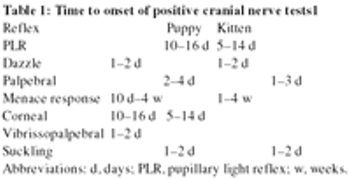James A. Lavely, DVM, DACVIM (neurology)
Articles by James A. Lavely, DVM, DACVIM (neurology)

The inability of our veterinary patients to speak to us can make determining the presence of pain a challenging process. Vocalization is often a clear sign that an animal is painful. However, even this can be misleading at times, as animals with brain disorders may vocalize without being painful.

Metronidazole toxicity typically occurs with dosages greater than 60 mg/kg/day. Cerebellar Purkinje cell loss and axonal degeneration may occur. Thus, cerebellar and vestibular signs such as ataxia, hypermetria and nystagmus may be seen with toxicity.

Gait evaluation in the pediatric patient can initially be difficult as puppies first learn to walk and the myelination process matures. As development progresses spinal disorders may become more apparent. Numerous congenital abnormalities resulting in spinal malformation exist.

Infectious diseases of the nervous system are relatively uncommon compared to other neurological abnormalities in adult animals. However, infectious diseases should be placed high on the differential diagnosis list in puppies and kittens.

The neurological examination of puppies and kittens can be challenging. Pediatric patients can be uncooperative and their various stages of development lead to different expectations of normalcy compared to adults.

Seizure disorders in young animals pose different considerations as to etiology and therapeutic decisions compared to adult dogs. Congenital, developmental, metabolic, toxic, infectious and inflammatory causes should be considered more likely in younger dogs and puppies. Seizures are the manifestation of abnormal synchronous electrical activity in the brain and are the most common neurological disorder in dogs.

Staphylococcus is a common cause of discospondylitis. Spinal epidural empyema (i.e. abcess) is most often associated with E. Coli, Bacteriodes spp and S. Intermedius.


